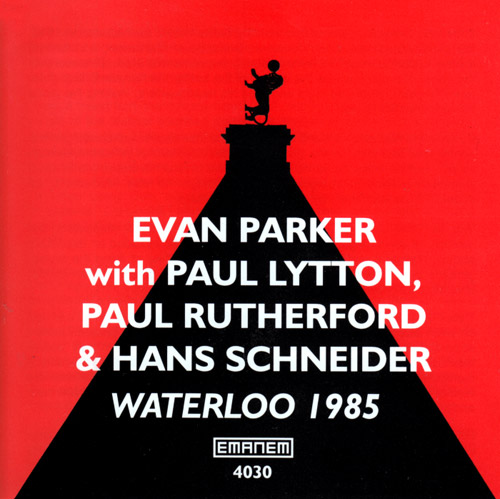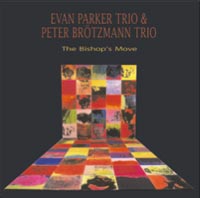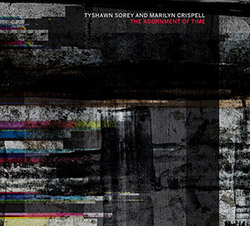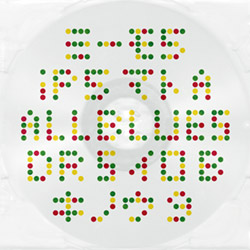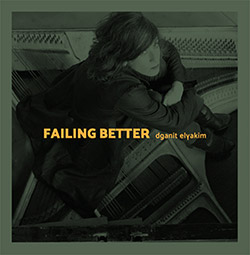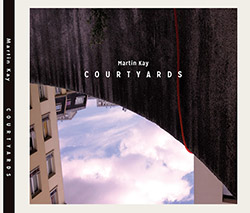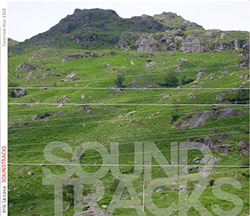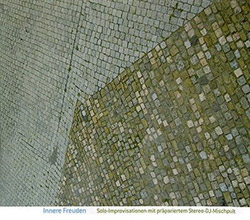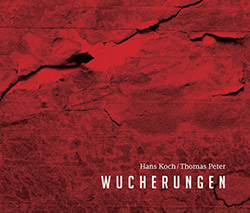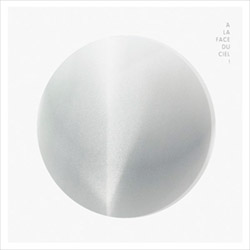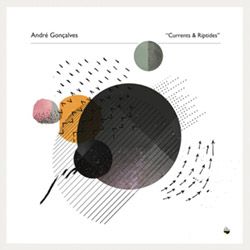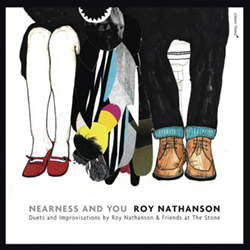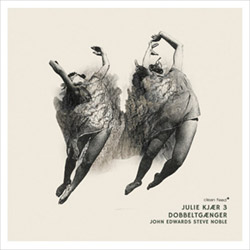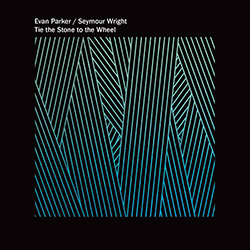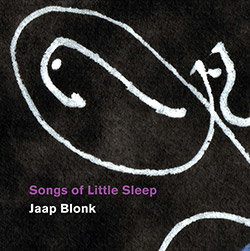
An hour long free improvisation by Evan Parker (saxophones), Paul Rutherford (trombone), Hans Schneider (double bass) & Paul Lytton (percussion & live electronics) performing at Le Festival Jazz et Musiques Improvisees, Waterloo, Belgium in 1985.
Out of Stock
Quantity in Basket: None
Log In to use our Wish List
Shipping Weight: 4.00 units
Sample The Album:
Evan Parker-soprano saxophone
Paul Rutherford-trombone
Hans Schneider-doublebass
Paul Lytton-percussion, live electronics
Click an artist name above to see in-stock items for that artist.
UPC: 5030243403028
Label: Emanem
Catalog ID: 4030
Squidco Product Code: 18409
Format: CD
Condition: New
Released: 1999
Country: Great Britain
Packaging: Jewel Case
Recorded at the Le Festival Jazz et Musiques Improvisees, Waterloo, Belgium August 17th, 1985, by Michael W. Huon.
"Evan Parker is a household name -- that is, if your household is occupied by aficionados of the British improvised music scene. Otherwise, you might not have heard of him. But no matter. If freely improvised music is your bag, this disc is for you: it documents a 1985 concert by Parker (soprano and tenor saxophones) and trombonist Paul Rutherford, bassist Hans Schneider and percussionist Paul Lytton.
As is often the case with this sort of thing, the instrumentation will mislead the unwary: not only is this not jazz, unless you listen closely you might not even believe that the instruments listed are the ones being used. That's because Schneider and Parker, in particular, employ extended techniques that produce lots of sounds not normally associated with their instruments -- whistling overtones from the bass, grunts and mutters from the sax, random skitterings from the percussion. The program consists of one hour-long track (titled "Dark Interior," for what that's worth), but its texture varies significantly as players drop in and out or turn temporarily to more lyrical approaches before returning to the skronky mayhem that prevails at the beginning and end."-Rick Anderson, allmusic.com
Artist Biographies
• Show Bio for Evan Parker "Evan Parker was born in Bristol in 1944 and began to play the saxophone at the age of 14. Initially he played alto and was an admirer of Paul Desmond; by 1960 he had switched to tenor and soprano, following the example of John Coltrane, a major influence who, he would later say, determined "my choice of everything". In 1962 he went to Birmingham University to study botany but a trip to New York, where he heard the Cecil Taylor trio (with Jimmy Lyons and Sunny Murray), prompted a change of mind. What he heard was "music of a strength and intensity to mark me for life ... l came back with my academic ambitions in tatters and a desperate dream of a life playing that kind of music - 'free jazz' they called it then." Parker stayed in Birmingham for a time, often playing with pianist Howard Riley. In 1966 he moved to London, became a frequent visitor to the Little Theatre Club, centre of the city's emerging free jazz scene, and was soon invited by drummer John Stevens to join the innovative Spontaneous Music Ensemble which was experimenting with new kinds of group improvisation. Parker's first issued recording was SME's 1968 Karyobin, with a line-up of Parker, Stevens, Derek Bailey, Dave Holland and Kenny Wheeler. Parker remained in SME through various fluctuating line-ups - at one point it comprised a duo of Stevens and himself - but the late 1960s also saw him involved in a number of other fruitful associations. He began a long-standing partnership with guitarist Bailey, with whom he formed the Music Improvisation Company and, in 1970, co-founded Incus Records. (Tony Oxley, in whose sextet Parker was then playing, was a third co-founder; Parker left Incus in the mid-1980s.) Another important connection was with the bassist Peter Kowald who introduced Parker to the German free jazz scene. This led to him playing on Peter Brötzmann's 1968 Machine Gun, Manfred Schoof's 1969 European Echoes and, in 1970, joining pianist Alex von Schlippenbach and percussionist Paul Lovens in the former's trio, of which he is still a member: their recordings include Pakistani Pomade, Three Nails Left, Detto Fra Di Noi, Elf Bagatellen and Physics. Parker pursued other European links, too, playing in the Pierre Favre Quartet (with Kowald and Swiss pianist Irene Schweizer) and in the Dutch Instant Composers Pool of Misha Mengelberg and Han Bennink. The different approaches to free jazz he encountered proved both a challenging and a rewarding experience. He later recalled that the German musicians favoured a "robust, energy-based thing, not to do with delicacy or detailed listening but to do with a kind of spirit-raising, a shamanistic intensity. And l had to find a way of surviving in the heat of that atmosphere ... But after a while those contexts became more interchangeable and more people were involved in the interactions, so all kinds of hybrid musics came out, all kinds of combinations of styles." A vital catalyst for these interactions were the large ensembles in which Parker participated in the 1970s: Schlippenbach's Globe Unity Orchestra, Chris McGregor's Brotherhood of Breath, Barry Guy's London Jazz Composers Orchestra (LJCO) and occasional big bands led by Kenny Wheeler. In the late 70s Parker also worked for a time in Wheeler's small group, recording Around Six and, in 1980, he formed his own trio with Guy and LJCO percussionist Paul Lytton (with whom he had already been working in a duo for nearly a decade). This group, together with the Schlippenbach trio, remains one of Parker's top musical priorities: their recordings include Tracks, Atlanta, Imaginary Values, Breaths and Heartbeats, The Redwood Sessions and At the Vortex. In 1980, Parker directed an Improvisers Symposium in Pisa and, in 1981, he organised a special project at London's Actual Festival. By the end of the 1980s he had played in most European countries and had made various tours to the USA, Canada, Australia, New Zealand and Japan. ln 1990, following the death of Chris McGregor, he was instrumental in organising various tributes to the pianist and his fellow Blue Notes; these included two discs by the Dedication Orchestra, Spirits Rejoice and lxesa. Though he has worked extensively in both large and small ensembles, Parker is perhaps best known for his solo soprano saxophone music, a singular body of work that in recent years has centred around his continuing exploration of techniques such as circular breathing, split tonguing, overblowing, multiphonics and cross-pattern fingering. These are technical devices, yet Parker's use of them is, he says, less analytical than intuitive; he has likened performing his solo work to entering a kind of trance-state. The resulting music is certainly hypnotic, an uninterrupted flow of snaky, densely-textured sound that Parker has described as "the illusion of polyphony". Many listeners have indeed found it hard to credit that one man can create such intricate, complex music in real time. Parker's first solo recordings, made in 1974, were reissued on the Saxophone Solos CD in 1995; more recent examples are Conic Sections and Process and Reality, on the latter of which he does, for the first time, experiment with multi-tracking. Heard alone on stage, few would disagree with writer Steve Lake that "There is, still, nothing else in music - jazz or otherwise - that remotely resembles an Evan Parker solo concert." While free improvisation has been Parker's main area of activity over the last three decades, he has also found time for other musical pursuits: he has played in 'popular' contexts with Annette Peacock, Scott Walker and the Charlie Watts big band; he has performed notated pieces by Gavin Bryars, Michael Nyman and Frederic Rzewski; he has written knowledgeably about various ethnic musics in Resonance magazine. A relatively new field of interest for Parker is improvising with live electronics, a dialogue he first documented on the 1990 Hall of Mirrors CD with Walter Prati. Later experiments with electronics in the context of larger ensembles have included the Synergetics - Phonomanie III project at Ullrichsberg in 1993 and concerts by the new EP2 (Evan Parker Electronic Project) in Berlin, Nancy and at the 1995 Stockholm Electronic Music Festival where Parker's regular trio improvised with real-time electronics processed by Prati, Marco Vecchi and Phillip Wachsmann. "Each of the acoustic instrumentalists has an electronic 'shadow' who tracks him and feeds a modified version of his output back to the real-time flow of the music." The late 80s and 90s brought Parker the chance to play with some of his early heroes. He worked with Cecil Taylor in small and large groups, played with Coltrane percussionist Rashied Ali, recorded with Paul Bley: he also played a solo set as support to Ornette Coleman when Skies of America received its UK premiere in 1988. The same period found Parker renewing his acquaintance with American colleagues such as Anthony Braxton, Steve Lacy and George Lewis, with all of whom he had played in the 1970s (often in the context of London's Company festivals). His 1993 duo concert with Braxton moved John Fordham in The Guardian to raptures over "saxophone improvisation of an intensity, virtuosity, drama and balance to tax the memory for comparison". Parker's 50th birthday in 1994 brought celebratory concerts in several cities, including London, New York and Chicago. The London performance, featuring the Parker and Schlippenbach trios, was issued on a highly-acclaimed two-CD set, while participants at the American concerts included various old friends as well as more recent collaborators in Borah Bergman and Joe Lovano. The NYC radio station WKCR marked the occasion by playing five days of Parker recordings. 1994 also saw the publication of the Evan Parker Discography, compiled by ltalian writer Francesco Martinelli, plus chapters on Parker in books on contemporary musics by John Corbett and Graham Lock. Parker's future plans involve exploring further possibilities in electronics and the development of his solo music. They also depend to a large degree on continuity of the trios, of the large ensembles, of his more occasional yet still long-standing associations with that pool of musicians to whose work he remains attracted. This attraction, he explained to Coda's Laurence Svirchev, is attributable to "the personal quality of an individual voice". The players to whom he is drawn "have a language which is coherent, that is, you know who the participants are. At the same time, their language is flexible enough that they can make sense of playing with each other ... l like people who can do that, who have an intensity of purpose." " ^ Hide Bio for Evan Parker • Show Bio for Paul Rutherford "Paul William Rutherford (29 February 1940 - 5 August 2007) was an English free improvising trombonist. Born in Greenwich, South East London, Rutherford initially played saxophone but switched to trombone. During the 1960s, he taught at the Guildhall School of Music and Drama. In 1970, Rutherford, guitarist Derek Bailey and bassist Barry Guy formed the improvising group Iskra 1903, which lasted until 1973. The formation was documented on a double album from Incus, later reissued with much bonus material on the 3-CD set Chapter One (Emanem, 2000). A film soundtrack was separately released as Buzz Soundtrack. Iskra 1903 was one of the earliest free improvising groups to omit a drummer/percussionist, permitting the players to explore a range of textures and dynamics which set it apart from such other contemporary improvising ensembles as SME and AMM. The group's unusual name is the Russian word for "spark"; it was the title of the Iskra revolutionary newspaper edited by Lenin. The "1903" designation means "20th century music for trio"; occasionally Evan Parker played with the group (Iskra 1904) and Rutherford also at one point assembled a 12-piece ensemble called, inevitably, Iskra 1912. The group was later revived with Philipp Wachsmann replacing Bailey, a phase of the group's life that lasted from roughly 1977 to 1995; its earlier work is documented on Chapter Two (Emanem, 2006) and its final recordings were issued on Maya (Iskra 1903) and Emanem (Frankfurt 1991). Rutherford also played with Globe Unity Orchestra, London Jazz Composer's Orchestra, Centipede, the Mike Westbrook Orchestra, and the Orckestra, a merger of avant-rock group Henry Cow, the Mike Westbrook Brass Band and folk singer Frankie Armstrong. He also played a very small number of gigs with Soft Machine. He is perhaps most famous for solo trombone improvisations. His album The Gentle Harm of the Bourgeoisie is a landmark recording in solo trombone and his 1983 Trio album Gheim, recorded at the Bracknell Jazz Festival is another acclaimed work. Rutherford died of cirrhosis of the liver and a ruptured aorta on 5 August 2007, aged 67." ^ Hide Bio for Paul Rutherford • Show Bio for Hans Schneider "Hans Schneider started playing in 1964 in a variety of beat, rock and jazz groups, joining the Georg Graewe Quintet in 1974. This has been a long standing working relationship which has included work with the GrubenKlangOrchester, though with a break from around 1983 and resurrected in 1990 to produce, among other things, the excellent recorded work of Spellings by Frisque Concordance. Another long working relationship was formed with Wolfgang Fuchs in 1978 via a trio with Klaus Huber on drums, through Xpact with Erhard Hirt on guitar and Paul Lytton on percussion and the foundation, with Fuchs, Hirt and others, of the King Ubu Orchestru. Hans Schneider was organiser of the first 'Internationale tage fur improvisierte musik' in Leverkusen in 1982 and was organiser and art director for the 1990 'Tage der improvisierten musik' [Days of improvised music] in Leverkusen. His list of collaborators includes Floros Floridis, Maggie Nichols, Peter Kowald, John Tchicai, Alex von Schlippenbach, Phil Minton, Sven-Ake Johansson, Kenny Wheeler, Peter Broetzmann, John Russell, David Moss, Gerry Hemingway, Alan Tomlinson, Klaus Koch, Phil Wachsmann, Gunter Christmann, Robert Dick, Evan Parker, Sebi Tramontana, Carlos Zingaro, and Fred van Hove. Current working ensembles include the Hans Schneider-Dorothea Schurch Duett - music for double bass and voice; Xpact [new version] with Dorothea Schurch and Paul Lytton, a trio/quartet with Paul Rutherford, Paul Lovens /and John Russell, and the 'Gratkowski Chamber Trio' with English tuba player Melvyn Poore and Frank Gratkowski." ^ Hide Bio for Hans Schneider • Show Bio for Paul Lytton "Paul Lytton (born 8 March 1947, London) is an English free jazz percussionist. Lytton began on drums at age 16. He played jazz in London in the late 1960s while taking lessons on the tabla from P.R. Desai. In 1969 he began experimenting with free improvisational music, working in a duo with saxophonist Evan Parker. After adding bassist Barry Guy, the ensemble became the Evan Parker Trio. He and Parker continued to work together into the 2000s; more recent releases include trio releases with Marilyn Crispell in 1996 (Natives and Aliens) and 1999 (After Appleby). A founding member of the London Musicians Collective, Lytton worked extensively on the London free improvisation scene in the 1970s, and aided Paul Lovens in the foundation of the Aachen Musicians' Cooperative in 1976. Lytton has toured North America and Japan both solo and with improvisational ensembles. In 1999, he toured with Ken Vandermark and Kent Kessler, and recorded with Vandermark on English Suites. Lytton also collaborated with Jeffrey Morgan (alto & tenor saxophone), with whom he recorded the CD "Terra Incognita" Live in Cologne, Germany. He played also on White Noise's pioneer electronic pop music album An Electric Storm in 1969." ^ Hide Bio for Paul Lytton
4/24/2024
Have a better biography or biography source? Please Contact Us so that we can update this biography.
4/24/2024
Have a better biography or biography source? Please Contact Us so that we can update this biography.
4/24/2024
Have a better biography or biography source? Please Contact Us so that we can update this biography.
4/24/2024
Have a better biography or biography source? Please Contact Us so that we can update this biography.
Track Listing:
1. Dark Interior 1:00:50
Improvised Music
Free Improvisation
London & UK Improv & Related Scenes
Quartet Recordings
Parker, Evan
EMANEM & psi
Instant Rewards
Search for other titles on the label:
Emanem.


